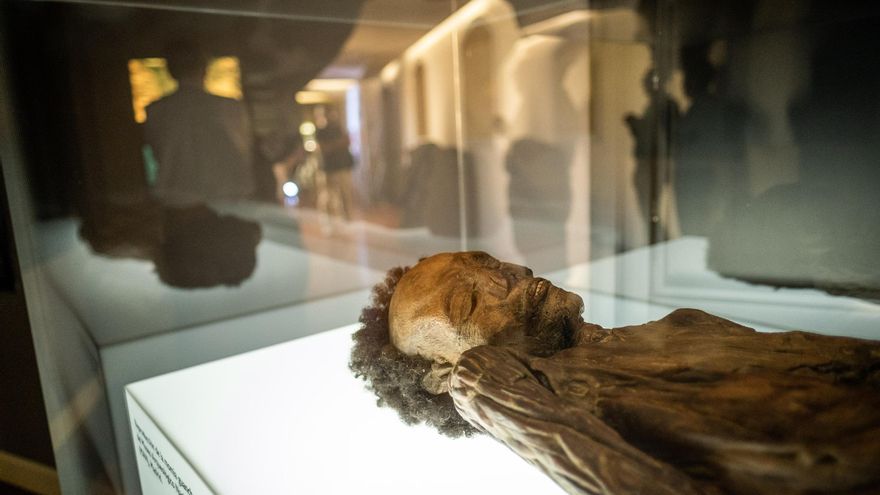
The Museo Arqueológico de Madrid has declined the return of the indigenous mummy from Erques to Tenerife as requested by the Cabildo de la Isla – for the eighth time – and the Parlamento de Canarias, as well as national deputy of CC, Cristina Valido, in the Congress. The national museum centre argues that there, the xaxo – mummy in Guanche – “has a historical context.” The director, Isabel Izquierdo, stated to Europa Press that “our position remains unchanged” in relation to previous refusals to return this “symbol” of the island’s history and culture, as well as of the entire Archipelago.
Izquierdo stated yesterday that the museum’s position regarding the possible return of the Guanche mummy from its collection to the Museo de Naturaleza y Arqueología de Tenerife “has not changed.” Although showing “empathy” towards Canarias, she recalls that “this is not the first request for transfer that the MAN has received,” and affirms that within the Museum, it has “a historical context” as well as being displayed “with strict conservation standards.” She emphasizes: “It is not about displaying human remains just for the sake of it, but rather there is a historical contextualisation.”
Significant Value
On the 20th of March, the Plenary of the Parlamento de Canarias approved, with the rejection of Vox, a Non-Legislative Proposal (PNL) from the Nationalist Group, defended by Ana Oramas, requesting the transfer to Tenerife of the Guanche mummy that has been exhibited at the MAN since 2015. The director of the national museum points out that the mummy represents “archaeological, historical, and ritual value” of archaeology, particularly of the pre-Hispanic history of the Canarian region. “The mummy is part of our permanent exhibition, is one of the key pieces of Canarian archaeology that is visited by over half a million people annually.”
Respect for Technical Criteria
The director believes that “we must try to respect the technical criteria of institutions and museum professionals.” In this regard, Izquierdo ensures that each request for restitution, return, or loan is “thoroughly studied” by the museum team, but the decision will be made by the Board of Trustees. In this sense, she requests respect for the technical criteria of institutions, “best practices” for the preservation of pieces, and, on the other hand, the legal aspects. “The documentation (of the Guanche mummy) is perfectly in order, and above all, what concerns us the most: the preservation of the artefact,” she points out. And she adds, “The mummy has never been intervened, it has not been restored, because the best restoration is no restoration.” She concludes by highlighting “the very high technological maintenance level” of the piece.
Cabildo
“It is necessary to open the debate that the original Guanche mummy discovered in the ravine of Erques (Arico), currently at the Museo Arqueológico de Madrid, returns to the Island. This is the moment, and this is what the Cabildo de Tenerife will officially request from the state.” This was stated at the end of last February by the vice president of Cabildo, Lope Afonso (PP), who explained how the public institution joined the request that same month made by the private entity Fundación Tamaimos. Afonso was hopeful that the eighth time might be the charm because it has already been requested seven times before. Afonso states, “There may be replicas there or anywhere else, but the original must be here as a symbol of our past to show residents and visitors.” The appropriate moment to which Lope Afonso refers is related to the announcement on the 22nd of January in the Congress of Deputies by the Minister of Culture of the Government of Spain, Ernest Urtasun. At that presentation, he proposed a “review process of the collections to overcome a colonial framework or one anchored in gender biases or ethnocentrism.” He recalled “Spain’s commitments translating into a review process” of the collections of state museums.
Parlamento de Canarias
On the 20th of March, the Nationalist Group’s deputy Ana Oramas, in her defence of the PNL for the return of the Erques mummy to the Island, lamented that all national governments had opposed this transfer for “political reasons or technical issues,” such as the “irreparable risks” that the return could pose, something that Oramas considers “overcome” since there have been mummy congresses in the Canary Islands, and even in 2013, two arrived from Argentina that are currently displayed in Tenerife. She also relied, like Lope Afonso, on the position of the Minister of Culture, Ernest Urtasun, to move past a “colonialist” view. Precisely, the fact that “Canarias was never a colony” was the reason why Vox opposed the return of the Guanche mummy. The party’s deputy, Nicasio Galván, prefers it to remain at the Museo Arqueológico de Madrid because “more than 500,000 people can see it there annually,” while in MUNA “it would not reach a sixth of that.”
Coalición Canaria’s deputy in the national Congress, Cristina Valido, recently presented a question at the end of March to “close the circle.” She wants to know if the Minister of Culture, Ernest Urtasun, plans to respond to the requests to make the return of the Guanche mummy effective. Valido insists that these are human remains of an inhabitant of this Island who lived with a culture and context from our past. Urtasun has not yet responded, but the director of MAN has. Well, to be precise, not yet.
















